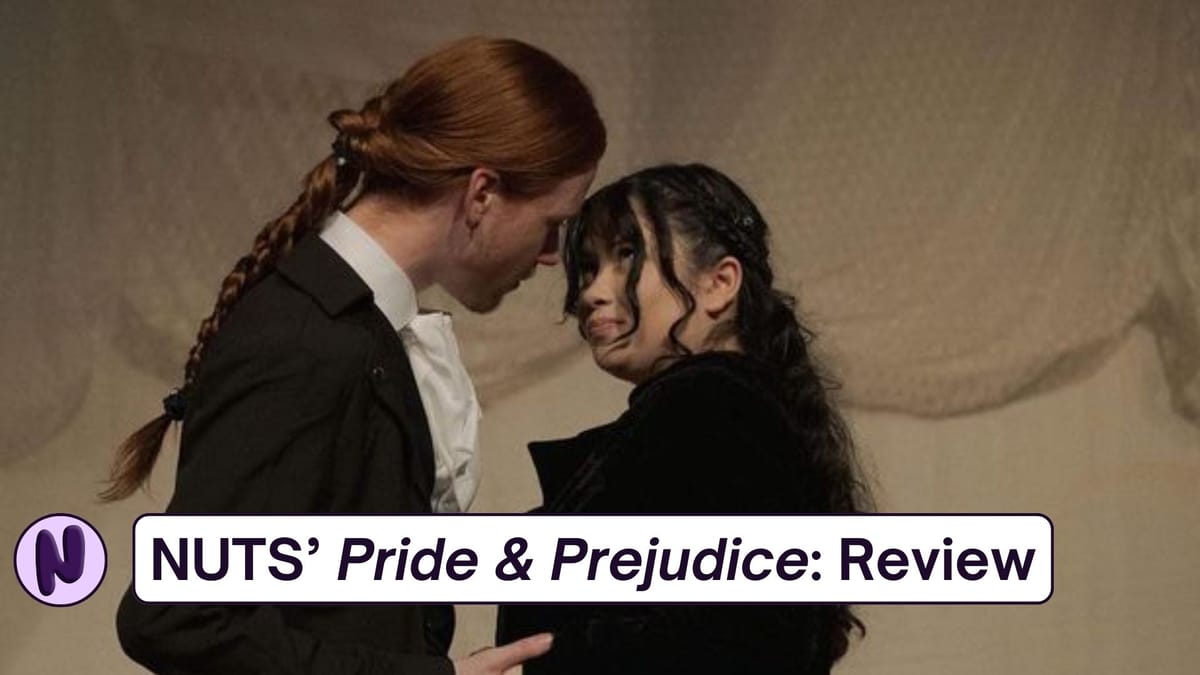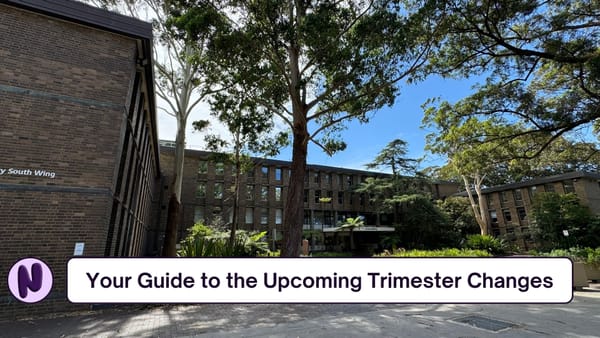NUTS' Pride & Prejudice: Review

To this author, Jane Austen’s Pride & Prejudice may be one of the most poorly interpreted classical texts in theatre. Modern creatives seem to have this ongoing tension between the ideas of authenticity and accessibility when it comes to this regency text – Jane Austen writing an interplay of comedy and drama that is often simplified and overdramatized instead of delivered with its deserved beauty and nuance. This tension was incredibly tangible in NUTS’ production of Pride & Prejudice directed by Julian Kumar and Divya Nandyal – for a story that is so well known and understood, this production didn’t seem to know what it was.
I came into this production hopeful and energetic – I am lucky enough to know almost the entire team of this show, who are beautiful humans – but with an overhanging sense of criticism. My dear friend, Coll Burns, who is playing Mr Darcy, remarked to me before the play that he was “interested to hear what I (you) think about the play” as someone who lives and breathes Pride & Prejudice. It is my favourite story ever written, and I praise its beauty as often as I am allowed to talk about it. I am admittedly a 2005 Knightley/Macfadyen purist (though much respect to BBC fans) and I knew coming into this, everything I saw would be compared to the emotions I felt on my first viewing of the film. I had just finished watching another film – likely a poorly executed Netflix original or an early 2000s romcom – and was lying in bed, sheets crumpled, fan spinning rhythmically. It was about 1am when I made the executive decision not to go to sleep, but to watch something else, my mouse hovering above Keira Knightley’s – who I had been in love with for as long as I can remember – magnified face. I sobbed, like an embarrassing amount, quietly so as not to wake my sleeping family, and it took a little while to settle myself before being able to finally sleep. I was completely in raptures over the beauty depicted by Austen (and director Joe Wright) and in typical fixation fashion, began to memorise all the information I could, watching video essays, making collages and posters, painting subpar portraits of the characters, learning to play the soundtrack on piano, and convincing myself I could recreate the costumes with my limited dressmaking skills (I could not).
So yes, you could say I like Pride & Prejudice. Perhaps just slightly more than a normal amount.
I don’t want to be too critical of this production because, in the end, I really did enjoy myself – Thursday night’s audience can attest to my relentless laughter. However, for a production that presents itself not as a reimagining of a piece of classic literature, but as a traditional presentation of it, I found myself disappointed.
I did have some issues with the scenes that were cut, which hindered the integral development of some of the play’s characters, however I am willing to overlook that for the sake of saving time – Act 1 already ran for 1.5 hours, and Act 2 for 1 hour.
What really bothered me was the characterisation of many of these beloved (or rightly hated) characters – many choices made cheapening the performance and distracting from its plot and the genuine talent of some of the actors. I feel people often have this association of Austen’s novels as being difficult to understand and inaccessible by nature, and as someone who struggles with reading because of OCD, I understand this to an extent. The beauty of a theatrical presentation of this text is that it has the power to override this – you are given the opportunity to present the nuance of the text on a physical plane, communicating complexities through inflections and expression, not to mention the numerous other devices of theatre.
The design of NUTS’ production most certainly took on this opportunity with great consideration – the set was simple, but did everything it needed to, the costumes were gorgeous (I’m willing to overlook elements of era inaccuracy), hair and makeup divine (besides Wickham’s wig), and the lighting and sound perfectly complementary, even with original composition. Henri Collyer and Sasha Bilanovsky, lead designers, and their team should be incredibly proud of the work they’ve done, working wonders under the confines of university theatre.
My grievances with the characterisation have little to do with the ability of the actors, the cast is full of quite capable performers, which is what makes it all the more saddening to see them reduced to cheap jokes and gags. One of the most prevalent examples of this to me was Lady Catherine de Bourgh. Stephanie Volos, who played both Lady Catherine and Lady Lucas, is truly an incredible actress, her expression is so detailed and voice work was well-honed – I truly believe with the right direction Volos would’ve played an incomparable Lady Catherine de Bourgh, doing Austen’s character justice. The role Lady Catherine is meant to serve in Pride & Prejudice is that of highest society, contrasting even the high-class Bingleys with her regal air and control. She keeps her composure, is snarky, but not too quick to obvious anger – after all, no one has ever opposed her. The themes of class difference and money, highlighted in Darcy’s love confession, come to a climax in Lady Catherine’s confrontation with Elizabeth Bennet – it is one of the most important moments in the whole play as we witness this clash between a predisposed engagement and the slowly unravelling love of Darcy and Lizzy. Throughout the duration of the scene, Lady Catherine’s composure is meant to gradually dissipate, but never truly fade away – in her frustration, she is still Lady Catherine de Bourgh. Harsh? Yes. Quick-witted and sharp with insults? Yes. But never out of control. The audience mustn’t see Lady Catherine lose her sense of control, rather Lizzy slipping out of its grips – her severity and class is what makes Lady Catherine de Bourgh such a powerful character in the story’s plot. Instead of displaying this, the confrontation scene saw Lady Catherine stamping her feet and throwing a tantrum when she wasn’t getting her way, acting juvenile and uncivilised, equating herself to the standard of Lizzy’s ‘silly’ youngest sisters, Kitty and Lydia. It completely tore me out of the scene – yes, it was funny, but it discounted the power of the moment. Pride & Prejudice is littered with comedy, Austen is absolutely hilarious, so why must we add unnecessary humour to a scene that requires anything but?
Maybe it is because I am so attached to her character, but I was taken aback by how mean and cold this production seemed to portray Elizabeth. Perhaps it can accredited to some of the ‘modern’ gags made, or maybe the way the play is structured as opposed to the novel, but I feel like I lost the kindness at the centre of Elizabeth that makes her so relatable – I almost felt unhappy at the end when Lizzy and Darcy united, as it felt Darcy’s vulnerability was not reciprocated. I will say though, there were many tender moments between the actors of Elizabeth and Jane that teetered on this point. In saying this, Eliza Hoh well-embodied Lizzy’s quick wit and occasional non-chalantness.
This one-dimensionality was a common flaw I found. It felt that if a character was funny, they could not be tender or smart. Jasmine Wood lit up the stage as Mrs Bennet, she is positively hilarious, however I wish she was given more opportunity to show the vulnerability of Mrs Bennet, a mother facing the dual melancholy of seeing her daughters grow up and leave the nest. A similar sentiment for Jane Bennet (Alisa Hamilton) and Charles Bingley (Toby Eastway) – both actors performed well, but I felt I was missing a consistent level of depth – the pair only being able to shine in their assigned moments, Jane’s letter and Bingley’s proposal, which were beautifully performed.
Some characters felt well represented, like Ines S.L.’s Caroline Bingley – she didn’t push to do too much with the character, embodying a simultaneous coldness and charm that was perfectly understated. Her character played the role it was assigned competently, enhancing the story rather than trying to steal the show. Another interpretation I loved was Dimitra Mavrocordatos as Mr Collins. I was surprised to find myself with this opinion as I am so fond of the way Tom Hollander depicts Mr Collins in the 2005 film – awkward, meek, but entitled – but I found Mavrocordatos was able to take what was truly important about the character, his pride and juxtaposing emptiness, and transform it into her own. Her Mr Collins was so bold and outspoken, yet still had the awkwardness that made him all the more off-putting. Mavrocordatos’ performance felt unique and fun and yet in no way did the purpose of the character stray from Austen’s intentions, giving a completeness to Mr Collins’ role in the story of Pride & Prejudice.
Whether many of these choices were made by the actors themselves, or the directors, I must credit the actors for their constant commitment to every choice – whether it was ‘good’ or not.
Trying to avoid all personal bias, I must talk about Coll Burns as Mr Darcy. The solitary point of the play in which I cried was Darcy’s letter in Act 2. I feel like Mr Darcy is such an easy character to get wrong, and yet Burns, in collaboration with Kumar and Nandyal, managed to present the deep passion yet painful restraint of this iconic character. In place of Matthew Macfadyen’s iconic ‘hand flex’, Burns opted for repeated small movements in their hands, lightly tapping on surfaces, rubbing his fingers together, and pulsing – it almost felt like a form of stimming for Darcy, which was a perfect, but not too on the nose, indication of neurodivergent-coding which is slipped in all throughout the original novel. Even as the romantic lead of the play, Mr Darcy doesn’t really have that many lines in Act 1 of the play, and yet his presence on stage is unequivocally felt, especially in contrast to the Bingley’s, Bennet’s, and Lucas’, Darcy keeping up this solemnity even when tempted by cheap comedy. Burns’ expertly dealt with Darcy’s character transformation, not completely flipping the character in revealing moments, but rather simply turning the page, demonstrating to the audience that this warmth was within this brooding figure all along. Darcy’s letter held even the rowdiest crowd in a forced silence – still and poised as a statue and lit by a single spotlight, Burns delivered an impassioned monologue, holding the audience in the palm of his hand and bringing them into an uproar at the end of the scene. Words escape me for this moment.
On the whole, I really enjoyed watching Pride & Prejudice, not just because it’s my favourite story, or because I have so many friends involved in the production, but because there was a sense of passion in the room. It was genuinely incredibly entertaining; general audience reactions speak to this – I didn’t speak to a single person who couldn’t find something or someone to fall in love with in this production. My criticism comes from a place of such love for the original text, and I can only be grateful for its increased exposure and value through this production! Out of the theatre left an audience with new and unique impressions of a classical text and an admiration of Kumar and Nandyal’s remarkable feat.




